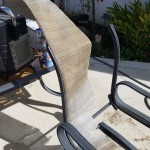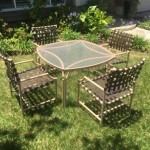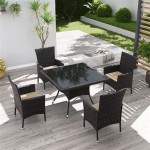Patio Furniture Weights: A Comprehensive Guide
Patio furniture is an essential part of any outdoor living space. It provides a place to relax, entertain guests, and enjoy the outdoors. However, before you purchase patio furniture, it is important to consider the weight of the furniture. Understanding how patio furniture weights affects stability, durability, and maintenance can help you make an informed decision that meets your needs.
Stability and Safety
The weight of patio furniture is a key factor in its stability. Heavier furniture is less likely to be knocked over by wind or other forces. This is especially important for furniture that will be used in areas with high winds, such as near a pool or on a windy deck. Heavier furniture is also less likely to tip over if someone sits on the edge or leans against it.
Durability
The weight of patio furniture is also a factor in its durability. Heavier furniture is more likely to withstand the elements, such as rain, snow, and sun. It is also less likely to be damaged by wear and tear. This makes heavier furniture a good choice for areas that will be used frequently or in harsh weather conditions.
Maintenance
The weight of patio furniture can also affect its maintenance. Heavier furniture is more difficult to move, which can make it more difficult to clean. It is also more difficult to store heavy furniture during the off-season. If you are considering heavy furniture, be sure to factor in the cost of moving and storing it.
Types of Patio Furniture Weights
There are a variety of different types of patio furniture weights available. The most common types include:
- Cast iron: Cast iron is a very heavy material that is often used for patio furniture. Cast iron furniture is very durable and can withstand the elements well. However, it is also very heavy and can be difficult to move.
- Steel: Steel is another heavy material that is often used for patio furniture. Steel furniture is strong and durable, but it is not as heavy as cast iron. Steel furniture is also less likely to rust than cast iron.
- Aluminum: Aluminum is a lightweight material that is often used for patio furniture. Aluminum furniture is easy to move and store, and it is not as likely to rust as steel or cast iron. However, aluminum furniture is not as strong as steel or cast iron.
- Plastic: Plastic is a lightweight material that is often used for patio furniture. Plastic furniture is easy to move and store, and it is not as likely to rust as metal. However, plastic furniture is not as strong as metal and can be damaged by the sun.
Choosing the Right Patio Furniture Weight
The weight of patio furniture is a personal preference. There is no right or wrong answer. The best way to choose the right weight for your patio furniture is to consider your needs and lifestyle. If you are looking for furniture that is stable and durable, then you may want to choose heavier furniture. If you are looking for furniture that is easy to move and store, then you may want to choose lighter furniture.
Conclusion
The weight of patio furniture is an important factor to consider when purchasing new furniture. By understanding how patio furniture weights affects stability, durability, and maintenance, you can make an informed decision that meets your needs.

12 Best Patio Furniture Sets The Strategist
Acp Advances In Air Quality Research Cur And Emerging Challenges

12 Best Patio Furniture Sets The Strategist

12 Best Patio Furniture Sets The Strategist

12 Best Patio Furniture Sets The Strategist

Source Identification And Mitigation Of Indoor Air Pollution Using Monitoring Data Cur Trends Sciencedirect

Garden Furniture Outdoor Sets Homebase

12 Best Patio Furniture Sets The Strategist

Patio Furniture Guide The Home

Frontiers Enhanced Integration Of Health Climate And Air Quality Management Planning At The Urban Scale
See Also








